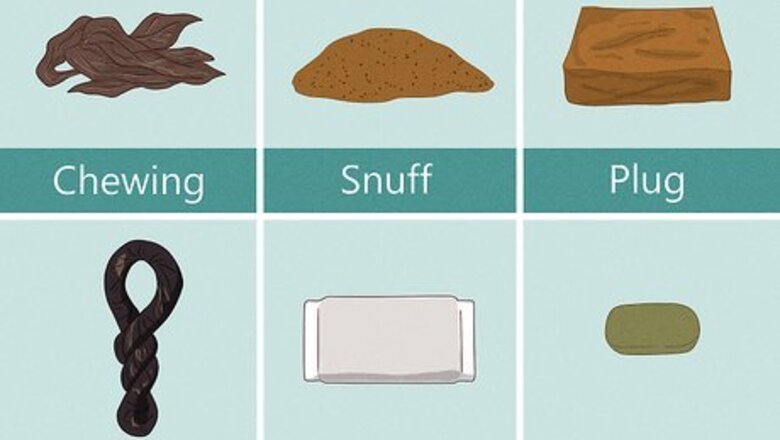
views
Purchasing the Chewing Tobacco
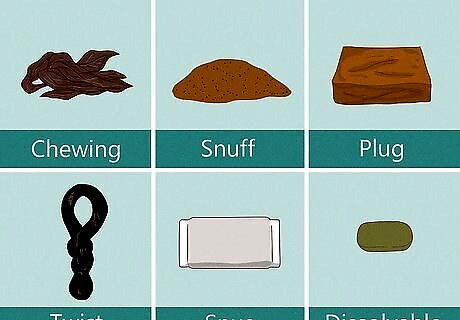
Note the different kinds of smokeless tobacco. Different forms are used in different ways. Chewing tobacco consists of loose, sweetened tobacco leaves that are sweetened. You put a wad of the tobacco between your cheek and gum and hold it there, sometimes for hours at a time. It's also called chew and chaw. Snuff is finely ground or shredded tobacco leaves. It's available in dry or moist forms and is packaged in tins or tea bag-like pouches. A pinch of snuff is placed between the lower lip and gum or cheek and gum. Dry forms of snuff can be sniffed into the nose. Using snuff is also called dipping. Plug is chewing tobacco that has been pressed into a brick shape, often with the help of syrup, such as molasses, which also sweetens the tobacco. You cut or bite off a piece of the plug and hold it between your cheek and gum. You spit out the tobacco juices. Twist is flavored chewing tobacco that has been braided and twisted into rope-like strands. You hold it between your cheek and gum and spit out the tobacco juices. Snus (the "u" is pronounced like the "e" in "news") smokeless, spit-less tobacco product. It comes in either a pouch or as a moist loose form that you stick between your upper lip and gum. You leave it in your mouth for about a half-hour or more without having to spit, then discard it. Dissolvable tobacco are pieces of compressed powdered tobacco, similar to small hard candies. They dissolve in your mouth, requiring no spitting. They're sometimes called tobacco lozenges, but they're not the same as the nicotine lozenges used to help you quit smoking.

Be aware of the brands of chewing tobacco available. There are many brands of chewing tobacco on the market today, which range in price and flavor. Some of the most popular are: Copenhagen is premium tobacco made by U.S. Smokeless and the most expensive moist tobacco on the market. It comes in flavors like Natural, Straight, Bourbon, Whisky, and Smooth. For a beginner, it may be best to start out with the Long Cut version of Copenhagen as it packs more easily and will stay together in your mouth as you get accustomed to chewing. Skoal is known for its high quality and variety of flavors, including Apple, Peach, and Wintergreen. Fruit flavors are good for a beginner chewer as they are milder than the mint varieties. Timberwolf is value-priced, high-quality tobacco. It comes in flavors like Apple, Peach, Mint, and Cool Wintergreen. Grizzly is considered “floor tobacco” for its cheap price. It comes in Mint and Wintergreen and is not recommended for beginners because of its high nicotine content.
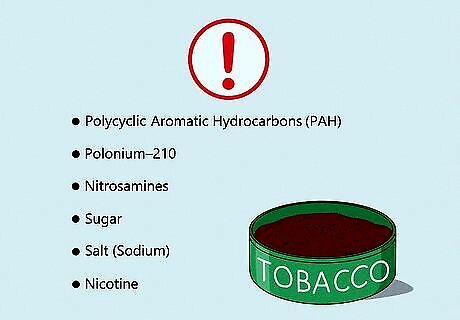
Learn about the chemicals in chewing tobacco. You might be surprised at what dangerous chemicals are found in smokeless tobacco products. Smokeless tobacco contains a number of cancer-causing chemicals such as polycyclic aromatic hydrocarbons (PAH), polonium–210 (a radioactive element found in tobacco fertilizer), and nitrosamines. Chewing tobacco contains sugar, which leads to tooth decay and gum disease. It also contains salt (sodium), which raises blood pressure. Of course, smokeless tobacco products also contain the addictive substance, nicotine.
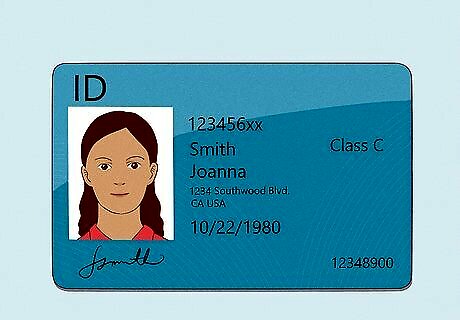
Have your state-issued identification ready when purchasing chewing tobacco. Just like cigarettes, you will be required to prove you are at least 21-years-old in the United States before you can purchase chewing tobacco.
Chewing the Tobacco
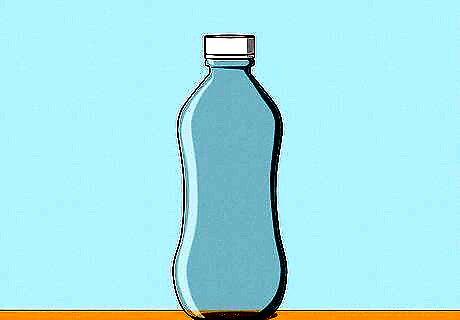
Get an empty water bottle. You will use the bottle to collect the spit from the chewing tobacco. If you are chewing tobacco outdoors, you can skip this step as you can simply spit the tobacco out on the ground. Be aware that some places ban spitting on the sidewalk. Know the laws in your city and state. Alternatively, you can use a cup. You can also purchase a spittoon for spitting into.
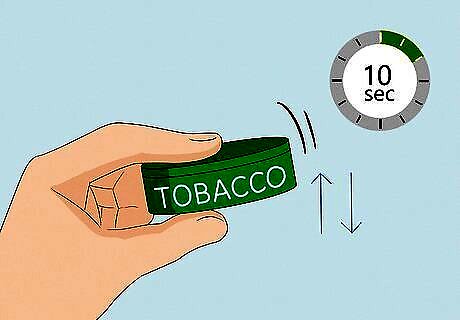
Pack the tobacco. Do this by shaking the tin between your thumb and pointer finger in an even up and down motion for about ten seconds. Packing the tobacco is important because this will make it easier to pinch the tobacco. If you are using a pouch, shake the pouch in an even up and down motion so the tobacco gets packed together in the pouch. Alternatively, you can also tap the tin or pouch on a hard surface to pack it.
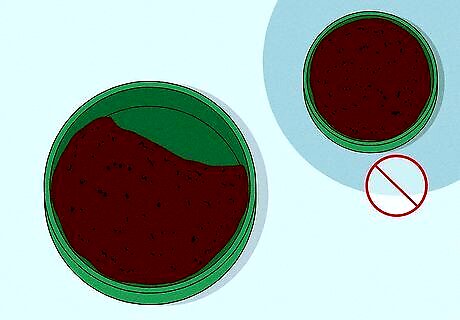
Check that the tobacco is properly packed. Open the tin or pouch and confirm that the tobacco is now firmly packed together. It should all be gathered on one side of the tin or pouch. If it is not properly packed, replace the lid and tap the tin again.
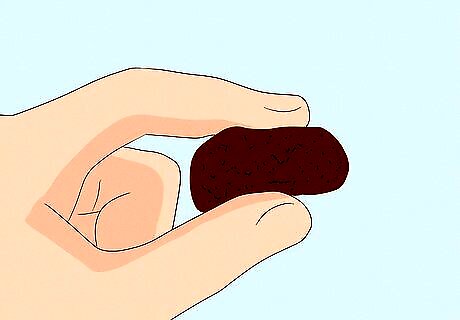
Lift a small amount of tobacco out of the tin with your thumb and pointer finger. Depending on how much tobacco you’d like to chew, lift more or less tobacco between your fingers. For beginners, start with a small amount of chew, about the size of a penny. As you become more comfortable chewing tobacco, you can increase the amount you use.
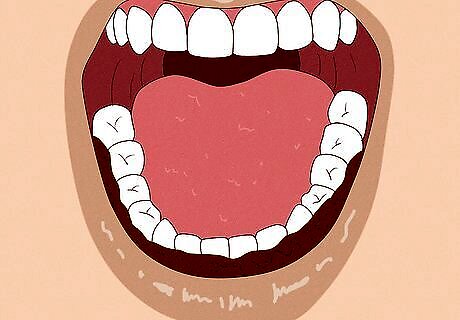
Place the chew in one side of your mouth, between your lip and your bottom teeth. While you may eventually feel comfortable enough with the chew to place it between your cheek and your back teeth, start with this placement as it is easier to keep in place. If you are having trouble keeping the tobacco in place, take an empty tea bag (or cut a tea bag open at the top and empty out the tea) and place the chew in the teabag. In effect you are creating something like a snuff pouch but with chewing tobacco. Place the tea bag of chew in your mouth, between your lip and bottom teeth. Using a tea bag will help the chew stay in place, but it will lessen the flavor.
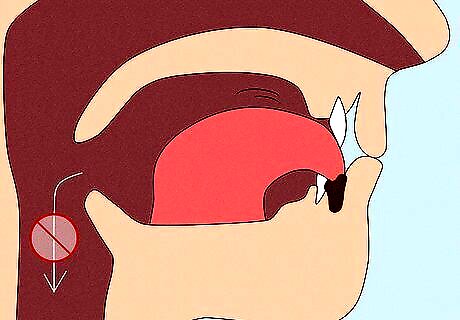
Move the tobacco around so that you can chew it and release the nicotine. Be very careful not to swallow any of it. When you put it in your mouth, you will most likely begin to salivate heavily. This is a normal reaction to the presence of the tobacco, as the oils from the chew interact with the saliva in your mouth. You need to chew the tobacco with your teeth to release the nicotine. Chew the tobacco lightly as you do not want to break up the leaves and accidentally swallow any of them. Chew for a little while to get nicotine out of the leaves then push the tobacco back between your cheek and gums with your tongue. Repeat as wanted. Getting tobacco in your throat or stomach will lead to vomiting and increase the chances of long-term health issues, so try to avoid swallowing any of the chew or chew-tainted spit. As you chew, you should feel the effects of the nicotine in the tobacco. You may feel light-headed, have a more rapid heartbeat, and an overall buzz, as well as a tingling sensation in your mouth. You may also feel nauseous or dizzy during your first time doing chew.

Spit after you have chewed the tobacco for a little while. Purse your lips and spit the juice out into the empty water bottle, another receptacle, or on the ground outdoors. Keep the tobacco in your mouth when you spit. Avoid spilling the bottle with the spit by keeping the cap on. Empty spittoons or cups regularly.
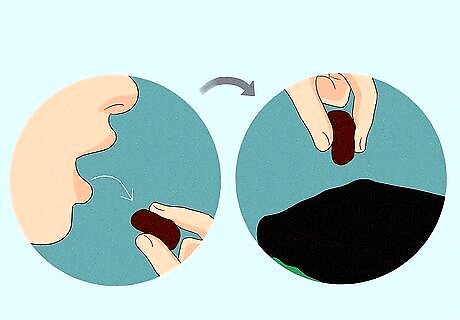
Remove the chew once the flavor is gone or if you start to feel ill. Take the chew out of your mouth with your fingers and throw it away. Rinse your mouth with water, being careful not to swallow any remaining tobacco or juice. You also want to brush your teeth as your breath will smell like tobacco. Brushing your teeth will not reduce the staining that will occur with chewing tobacco.
Understanding the Health Risks of Chewing Tobacco
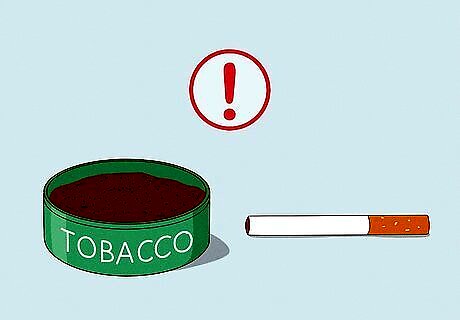
Chewing tobacco has the same serious health risks as cigarettes. Like other tobacco products, smokeless tobacco contains nicotine, a dangerous and addictive substance. Most people who chew become addicted to it. Just as with smoking, withdrawal from smokeless tobacco can cause symptoms like intense cravings, increased appetite, irritability, and depression. While chew was very popular among many major league baseball players in the past, the league currently prohibits the use of chew by players and strongly discourages clubhouse attendants from purchasing chew for players. Probably the most well-known professional baseball player to advocate against chewing tobacco is outfielder Bill Tuttle. After thirty years of playing and chewing in the professional league, Tuttle had a tumor so big it came through his cheek and extended through his skin. Doctors removed the tumor, likely the result of his decade-long chew habit, and also had to remove much of Tuttle’s face. Chew cost Tuttle his jawbone, right cheekbone, the majority of his teeth and gum-line, as well as his taste buds. Tuttle eventually died from cancer in 1998 but spent his last years trying to steer people away from doing chew.
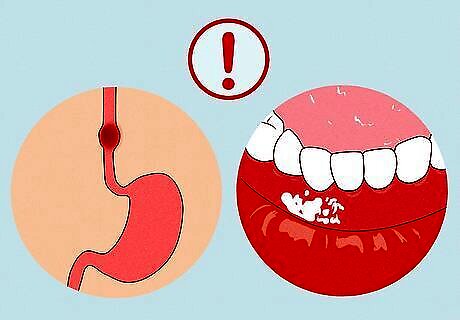
Recognize you are at a higher risk for mouth cancer, disease, and infection. Chewing tobacco greatly increases your chances of cancer, including esophageal cancer, as well as cancers of the mouth, throat, cheek, gums, lips, and tongue, and pancreatic cancer. An accumulation of chew over an extended period of time will also likely lead to tooth decay. Chew contains high amounts of sugar, which contributes to cavities, and also contains coarse particles that irritate your gums and scratch away at the enamel on your teeth, making your teeth weaker and more susceptible to cavities and infection. The sugar and irritants in chewing tobacco also cause your gums to pull away from your teeth, especially in the area of your mouth where you chew. This can lead to gum disease, which can be severe enough to destroy the soft tissue and bone that support your teeth and lead to tooth loss. Chewing tobacco also increases your risk of developing precancerous lesions in your mouth, called leukoplakia, that could one day become cancer. Each year about 30,000 Americans learn they have mouth and throat cancers, and nearly 8,000 die from these diseases. Only about half of the people diagnosed with mouth or throat cancer survive more than 5 years. Some forms of smokeless tobacco, like chew, increase your heart rate and blood pressure. Studies suggest that long-term use of smokeless tobacco can increase your risk of dying from certain types of heart disease and stroke.

Get help if you are trying to quit doing chew or want to avoid trying chew. Some smokers switch to chew in the hopes it will lessen their tobacco addiction, but this rarely works and can in fact lead to a greater addiction to tobacco. If you are trying to quit using chew, talk to your doctor about preventative methods like using nicotine gum, the patch, or other medications. Smoking cessation programs are offered by hospitals, health departments, community centers, employers/worksites, and national organizations. Using substitutes like gum, beef jerky, hard candy, or dried fruits instead of chew can also help to lessen your tobacco addiction by curbing the oral fixation. Teens who use chew are more likely to become smokers later in life.

















Comments
0 comment